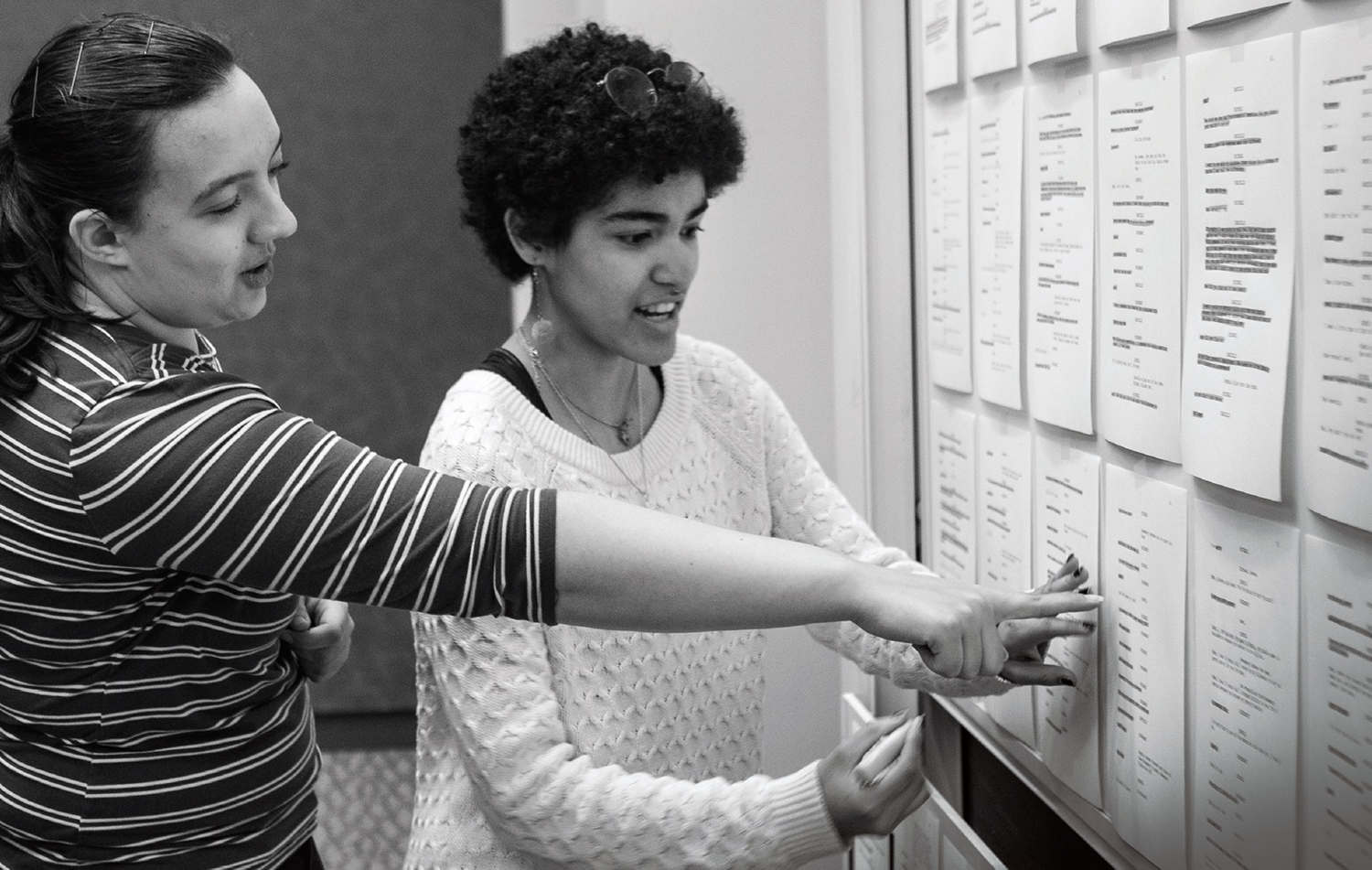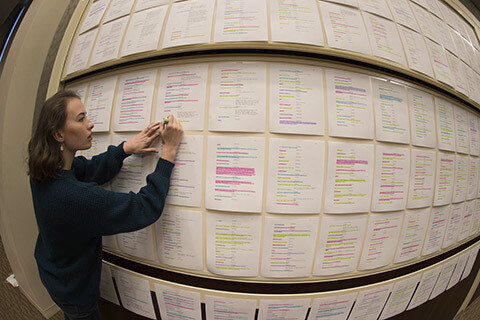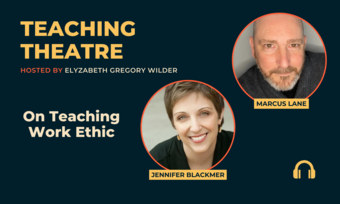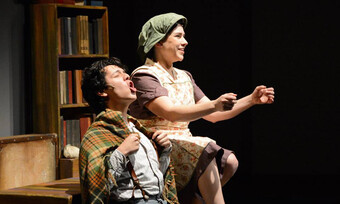A Couple Clarifications
Before I can explain my thought process and my eventual decision, I need to make something clear: I don’t give in to the lazy notion that you can’t make money in the arts. I imagine that anyone who has ever even considered undergrad arts education has had a well-meaning person say: “You won’t be able to get a job,” or: “If you can do something else, do that instead.” If what they mean is that a life in the arts is hard then, yes, it can be hard sometimes. If what they mean is have a backup plan—sure, have a dozen backup plans that keep your options open. If what they mean is that it might not go how you expect—yes, it will definitely not go how you expect. But if they mean that it is impossible, that’s not true. I, myself, am an unexceptional example. I’ve split my time as a writer, educator, sound designer, and arts administrator. I’ve made my living in the field, just not necessarily in the way I pictured. Which seems to be the story of most people I know who have found success.
I should also make clear that I recognize the cost of college is an issue. Any faculty member I know is aware of how much students pay, possibly because they are still paying their own student loans. We work to make any class or program worthwhile. This whole article could devolve into a side tangent about tuition costs, school loans, and university spending. Another article could be written on the global pandemic and how it will likely have economic effects that will reverberate for years, only exacerbating the financial issues of college. While I certainly have strong opinions on these issues, my expertise is limited. And the systemic problems of the cost of college wasn’t what I was tasked to solve. While I don’t draw any exact parallels, I hope the questions posed by this process, and the answers we came up with, resonant with current challenges.
What would it mean to send this many students out in the world with one set goal? It felt like I’d be making a promise I couldn’t keep.
The Problem
When I started working at Ball State, I became a faculty member of the theatrical studies option. This option did include students who were interested in playwriting, but the freshman classes were primarily made up of students who auditioned for the other programs, didn’t get in, but still wanted to pursue theatre. Often these students didn’t know you could study playwriting. Yet over their time, thanks to a particular class or an opportunity, ambitious students cultivated a skillset in a particular area, such as playwriting, dramaturgy, arts administration, or casting.
The question was: Could I create a program for the portion of students interested in playwriting? The follow up question: Should I?
From a faculty perspective, creating a playwriting option requires its own financial feasibility. To offer option-specific classes regularly, I would need to have enough students to fill out those classes. I started imagining the fifteen students who would graduate four years after we started the program. And then the fifteen more the year after that. What would it mean to send this many students out in the world with one set goal? It felt like I’d be making a promise I couldn’t keep.
To come clean, I should say: I studied playwriting as an undergraduate. I was technically in theatre studies but, along with three peers, focused on playwriting, which offered specific classes and gave me some validation in calling myself a playwright. As part of a senior capstone class that prepared us for the transition from academia, my professor said something to the effect of, “The world doesn’t need young playwrights in the way it needs young actors or even young people to work backstage.” And it’s true on a practical level. There are casting calls that are looking for twenty-two-year-olds. There are entry-level theatre jobs that are perfect for the recently graduated. But it turns out that an emerging playwright can be in their mid-thirties... or beyond.
Does the theatre field need twenty-two-year-old playwrights? I don’t mean a specific person, but does the field generally need young playwrights? Can someone further along in their craft and their life experience write a convincing contemporary teenager? Or do we need more young people to write from a young perspective, just like we need young people to embody young characters? If we do need a younger generational perspective, how many will we need? Is it okay if an undergrad program is just a fostering ground for masters programs?
An Argument For
As I started plotting out what playwriting option course requirements would look like, I kept wrestling with all these questions, wondering if this was something we should be doing.
The major argument for creating a playwriting option ran along the lines of: Who cares what you study in college as long as you are passionate and persistent? I believe that going to college for basically anything is worthwhile. My favorite poet is Mary Oliver, and she has this great quote about higher-level education: “College is where you learn how to learn. Four years isn’t too much time to spend at that.” For me, the priority is on cultivating curious, creative, engaged citizens.
How important is it to make sure that my students get work in the field? Training in the arts might lead to jobs in the arts, but it also prepares students for all kinds of careers. The skills in playwriting transfer so easily to other areas: problem-solving, storytelling, communication, and collaboration. Part of my job is to teach students how to talk about their skills in different contexts.
The major argument for creating a playwriting option ran along the lines of: Who cares what you study in college as long as you are passionate and persistent?
I think what that Mary Oliver quote alludes to is that college can’t only be about getting a job. There has been lots of discussion of the increasingly transactional nature of the college experience. Some students want to pay their tuition, do the work, and get a grade so they can get a job and have a nice life. They’ve prepared for this their entire scholastic career. I know in my high school it was clear that if I did well on homework and tests, I would get good grades. And if I got good grades I would get into a good college. And if I did well there, I would get a job. But good grades don’t necessarily equal a career.
Success in the arts is a messy combination of luck, privilege, and hard work. I think college has more to offer than a guarantee of a steady paycheck. It is the chance to learn to think critically, to appreciate deeply, to make work that is satisfying to you and an audience no matter the budget or scale. Our department does a remarkable job of emphasizing that we are working to foster not just good artists, but good people.
I acknowledge that it is another kind of privilege to argue that getting a job after college isn’t the primary goal. But it is a privilege I would like more people to have—to let the pressures of a future career fade for at least part of the four years students spend at college. Ultimately, I would argue that studying the arts can offer skills that can lead to careers, but also experiences that can provide for a good life outside a capitalistic understanding of success.
An Argument Against
While part of me started leaning toward creating a playwriting option, I had another thought that kept pulling me in a different direction. In our department, with over five hundred students at last count, we talk a quite bit about siloing. We worry that our actors stick with actors, dancers with dancers, designers with designers, and that students only cross paths in predefined roles in student productions. First-year students seem to happily embrace the labels that give them an identity and a tribe. But the faculty have an impulse to push back and create space for cross-disciplinary work in our core classes.
Perhaps the biggest casualty of a playwriting option would not necessarily be the students who would be in it, but the ones who would be left behind. One of the main problems of the theatrical studies option is that it lacked an identity. It included both students who hadn’t figured out their place and students who inexplicitly had heard of dramaturgs and wanted to be one. Too often these students were not defined by what they were, but by what they were not. They were not-actors, not-directors, and not-designers. I wondered: What happens to them if another aspect of theatremaking is cordoned off?
Creating a playwriting option would make another line in the sand. It would symbolically be a way of dividing the students into different groups: These are the students who write. These other students are the ones who perform. These other other students are the ones who direct. And on and on. But that is directly opposed to the kinds of artists I most admire.
I want to make students who are adaptable, versatile, and resilient. I’m a fan of hybrid artists. Give me your director/dancer, playwright/stage manager, performer/lighting designer. I’m not looking for everyone to be a generalist, but picking only one path seems to close off so many doors. Careers are long, who knows if you might want to direct, or if you are amazing at marketing (after all, it’s the marketing department who makes the first impression with your audience). I think every theatre student should at least write a ten-minute play—I don’t care how good it turns out. I think every student should be in a new play reading. It will teach them about what it means to tackle something that is new, that is untested, that might not be good but could be.
Perhaps the biggest casualty of a playwriting option would not necessarily be the students who would be in it, but the ones who would be left behind.
What We Did
So: What did we do? We didn’t create a playwriting option. Instead, we created a minor and started tackling our theatrical studies problem.
It may feel like semantics to create a minor instead of an option, but the implications are significant. Our “new works for the stage” minor encourages students to take a multidisciplinary approach to creating new work and requires students to take writing classes, performance classes, and directing/production classes pulled from the Theatre and Dance Department, the Music Department, and the English Department. It does not define new work solely as playwriting, but has room for solo shows, self-production, and devised work.
More importantly, this minor is open to everyone. For my theatre studies students who choose to participate, it can give them a bit of identity, while inviting designers, directors, performers, and students from outside the department to cross-pollinate. It essentially gives students a way to build on classes they are already taking by choosing electives that will help them pursue their goals. In the first year of the minor, I had two students align their electives and take new classes to graduate with the minor.
The bigger challenge was investing in our theatre studies program. To begin, I felt we needed a name change. As a writer, I believe that language matters. “Theatrical studies” feels either like we are in theatre appreciation or we are preparing the next generation of theatre history professors. And while we might have some future PhDs, this didn’t reflect how much our students make art, not just study it. I researched other programs that had shifted how they dealt with undergraduate playwrights. Some were part of English departments. Some were tied to a screenwriting department. But I was most drawn to programs that spoke dynamically to hybrid artists, like the performance creation program offered by the University of Concordia in Montreal and the original works program offered by Cornish College in Seattle.
We rebranded ourselves as “theatre creation” to better reflect the variety of makers that our option encompasses: playwrights, dramaturgs, performers, administrators, and hybrid theatre artists of all stripes. Is it a perfect name? Maybe not, but I think it’s a marked improvement and I wasn’t going to have it sit around in committees for years before we took a step in the right direction.














Comments
The article is just the start of the conversation—we want to know what you think about this subject, too! HowlRound is a space for knowledge-sharing, and we welcome spirited, thoughtful, and on-topic dialogue. Find our full comments policy here
Tom - Good article. I just retired a couple of weeks ago after teaching playwriting for 20 years at Queen's University here in Kingston, Ontario, Canada, and 10 years before that at Studio 58, a conservatory program in Vancouver. I long ago concluded that (a) it was not necessarily my job to train professional playwrights (though I have turned out a few), and (b) training in playwriting is useful in all kinds of disciplines, even some that we don't think of as creative or related to theatre. I think it helped that the way I got started was by being invited to teach at Studio 58, not necessarily to create playwrights, but to create theatre artists who had some experience in what everybody else was doing. So I agree that we're not flooding the market with superfluous young playwrights; we're turning out theatre artists, other kinds of artists, and just plain other kinds of people, who have learned something about creativity and problem-solving, in this case through the lens of playwriting. All the best - John
It's so affirming to hear other people thinking along the same lines. Your A and B conclusions are exactly what my gut said. I'm hoping that my choices about the formal structures of my program help communicate those ideas to my students.
Thank you for this frank admission, Tom. These are issues that I’ve spoken of many times as head of my own playwriting program at Catholic University in DC. I even wrote a book, “Life As a Playwright,“ to try and dispel any notion of having a traditional “career” as a writer in the theatre. I’ve had many of the same doubts about my MFA program, and think many of your questions apply to graduate students too. That’s why I’ve always insisted on admitting no more grad students than we can award with full tuition scholarships. It helps me sleep at night.
Fascinating to hear that these issues still come up with MFA students. And Kudos to you for working to get your students full scholarships.
I think a good reality check is in order. Some playwrights make it. The vast majority don’t. I have seen plenty of playwrights – in both B.A. and M.F.A programs struggle to find success (myself included). I didn’t know how hard it would be. Todd London’s Outrageous Fortune: The Life and Times of the New American Play written over ten years ago is as relevant if not more so today. The book demonstrates how even highly acclaimed playwrights struggle to make a living – and the situation hasn’t gotten any better. This should be required reading in any playwriting program. The fact is the eco-system of new play production and playwrights earning a living as playwrights is broken and has been for a long time. Many playwrights can segue their talents into other endeavors, so it is not totally a lost cause for anyone who gets a degree in playwriting. Just realize that playwriting will be your side gig, not the one that brings home the bacon.
I worked on and off with Sam Shepard over some decades, and you might be interested in what he had to say on the subject of theatre "options." From an interview I published back in 1981, he said: "I think all of the designated professions in the theatre are really worthless....And the more they're defined, the more they tend to fragment the sense of the wholeness of the production." So he wrote and acted and directed and designed, sometimes all at the same time. And the results, I'd say, weren't bad. More power to the students who cross the lines!
That's a lovely quote from Sam Shepard. I may bring that to my students. Sometimes hearing ideas from other sources can really make things click.
Hi Tom! So great to see your name on this forum. I love this article - it speaks to my love of (and success in) a hybrid career. I think it's key to navigating the gig world. A handful of our new graduates (at MSU) head to New York, but even more fan out regionally, and the more tools in their pocket, the better. Thanks for this!
Hi Claire! Good to see you hear too! ...and soomething about what you wrote connected some dots for me. I think in major markets - like New York and Chicago - it's easier to specialize, but in different regions it can be necessary to have lots of skills to adapt. I wonder if part of my love of hybrid artists comes from a desire to invest in theater in all sorts of communities, by training the next generation of artist to make careers anywhere.